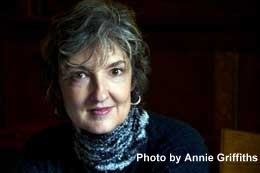Barbara Kingsolver was born in 1955 and spent most of her early life in rural eastern Kentucky. On her website, she writes about the freedom she had as a child, roaming the woodland around her home and catching ‘wild creatures’ which – apart from mice and snakes – she was allowed to bring into the house. Several times when she was growing up, her father donated his services as a medical doctor and took the family to live abroad. On one such occasion in 1963, they spent a year living in a remote village in the newly independent Republic of the Congo. For the young Kingsolver and her siblings, these periods were full of adventure where even more exotic wildlife could be captured and studied, but they also made a deep impact on her later life and career. It was during these times, living in impoverished communities with cultures very different from her own, that Kingsolver developed an awareness of the world outside of Kentucky that set her apart from her peers and left her with a sense of foreignness in her own homeland.
In 1973, she received a music scholarship to study classical piano at De Pauw University in Indiana, but changed her major and graduated with a degree in biology in 1977. After a brief spell in Europe, she moved to Arizona so that she could experience ‘The West’. There, she worked as a lab technician at the University of Arizona where she later earned a Masters degree in ecology and evolutionary biology.
Despite her scientific leanings, writing and story telling have long been a part of Kingsolver’s life. From a young age, she enjoyed making up stories to entertain her family, and at school she won praise for her passionate essays. As an undergraduate student, she took a Creative Writing class and, though she kept it hidden from her science colleagues, continued writing poetry and short stories throughout this time.
Her childhood interest in nature, coupled with her scientist’s curiosity and keen observational skills fostered in Kingsolver a deep connection with the natural world. This connection, along with her empathy for the outsider, has been evident in her work since the publication of her first novel, The Bean Trees (1988), which explored the lives of illegal immigrants living on the fringes of Arizona society.
Although she is best known for novels such as Pigs in Heaven (1993), The Poisonwood Bible (1998), and the book for which she won this year’s Orange Prize for Fiction, The Lacuna (2009), she is also the author of the collection Homeland and Other Stories (1989). In 2001, she served as editor for the Best American Short Stories anthology, and the essay ‘What Good is a Story?’ describes how she selected the twenty stories that eventually went into that collection by looking for those that told her something new, showed her something in a new way or confirmed what she suspected but had not, herself, been able to put into words. In an interview with Bénédicte Meillon, published in the Journal of the Short Story in English (2003), Kingsolver says that during this process ‘I read so many stories I just didn’t care for, that didn’t move me….[After reading] most of them, when I finished I was just exactly the same person as when I started.’ She is dismissive of what she calls The New Yorker stories, stories which she believes lack meaning or purpose. For Kingsolver, writing fiction is a way of creating a discussion about issues of social and political importance and she believes that her role as a writer is not simply to entertain the reader, but to inform and enlighten.
In the Meillon interview, she also discusses what she sees as being the main differences between short stories and longer forms of fiction, pointing out that her novels are driven by the themes she wants to explore, whereas her short stories are largely driven by plot. Though it is clear that she prefers writing novels, because of the ‘broad canvas’ they provide, she concedes that the shorter form is more amenable to experimentation and, interestingly, for an author who prides herself on the accessibility of her novels, admits that her stories tend to be of a higher literary standard.
Kingsolver is often praised for her characterisation and vivid use of imagery, but detractors are critical of the heavy-handed way her novels drive their message home. There is a liberal worthiness to much of her writing which does little to challenge the perceptions of the unconverted. Her short stories, however, because the focus is on character and plot, are far more subtle in the way they explore the personal traumas of the marginalised. Like her novels, Homeland and Other Stories tackles important issues, but the issues here are of a more personal nature, the sort which many of us can identify with in our own lives – small town prejudice, child abuse, broken relationships, and personal identity. By letting the reader experience these trials through the eyes of an individual character, the messages these stories convey become all the more relevant and all the more powerful.
NB: Kingsolver is the founder and patron of the Bellwether Prize for fiction which make a biennial award of $25,000 for an unpublished novel that addresses themes of social and moral importance.
 by
by